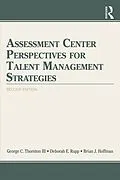Written by three leading scholars with vast experience in the science and practice of assessment centers (ACs), this is the first volume to comprehensively integrate variations of the assessment center method with alternative talent management strategies. A useful reference guide, it examines the many ways in which organizations can apply the assessment center method to achieve their talent management goals. It provides balanced and in-depth coverage of theory, research, and practice pertaining to the dimension-, task-, and multifaceted-perspectives on the AC method. Ideal for researchers, practitioners, and students alike, and well suited for courses in testing and measurement, personnel selection, HR planning and staffing, training and development, and organizational change, Assessment Center Perspectives for Talent Management Strategies is a complete and up-to-date account of the assessment center method.
Autorentext
George C. Thornton III is Professor Emeritus of Psychology, Colorado State University, USA.
Deborah E. Rupp is Professor and William C. Byham Chair of Industrial/Organizational Psychology, and Affiliate Professor, Krannert School of Business, Purdue University, USA.
Brian J. Hoffman is an Associate Professor of Psychology, University of Georgia, USA.
Inhalt
SECTION I: INTRODUCTION
1 Assessment Centers and Talent Management in Modern Organizations
2 Talent Management Strategies and Assessment Center Perspectives
SECTION II: ELEMENTS OF THE ASSESSMENT CENTER METHOD
3 Job Analysis and Beyond: Determining the Focal Constructs for Assessment Centers
4 Simulation Exercises
5 The Roles of Individual Assessors: Observing, Recording, Classifying, and Scaling Behavior
6 The Roles of the Group of Assessors: Integration of Assessment Information
7 Providing Feedback of Assessment Center Results
8 Technology and Assessment Centers
SECTION III: VALIDATION EVIDENCE
9 Internal and External Evidence of Construct Validity
10 A Broader Evaluation of Assessment Center Methods for Different Purposes
11 The Social Validity of Assessment Centers: Fairness, Discrimination, Humanitarianism, and Social Change
SECTION IV: CONCLUSIONS
12 The Assessment Center Method: The Continuing Evolution of Theory, Research, and Practice
